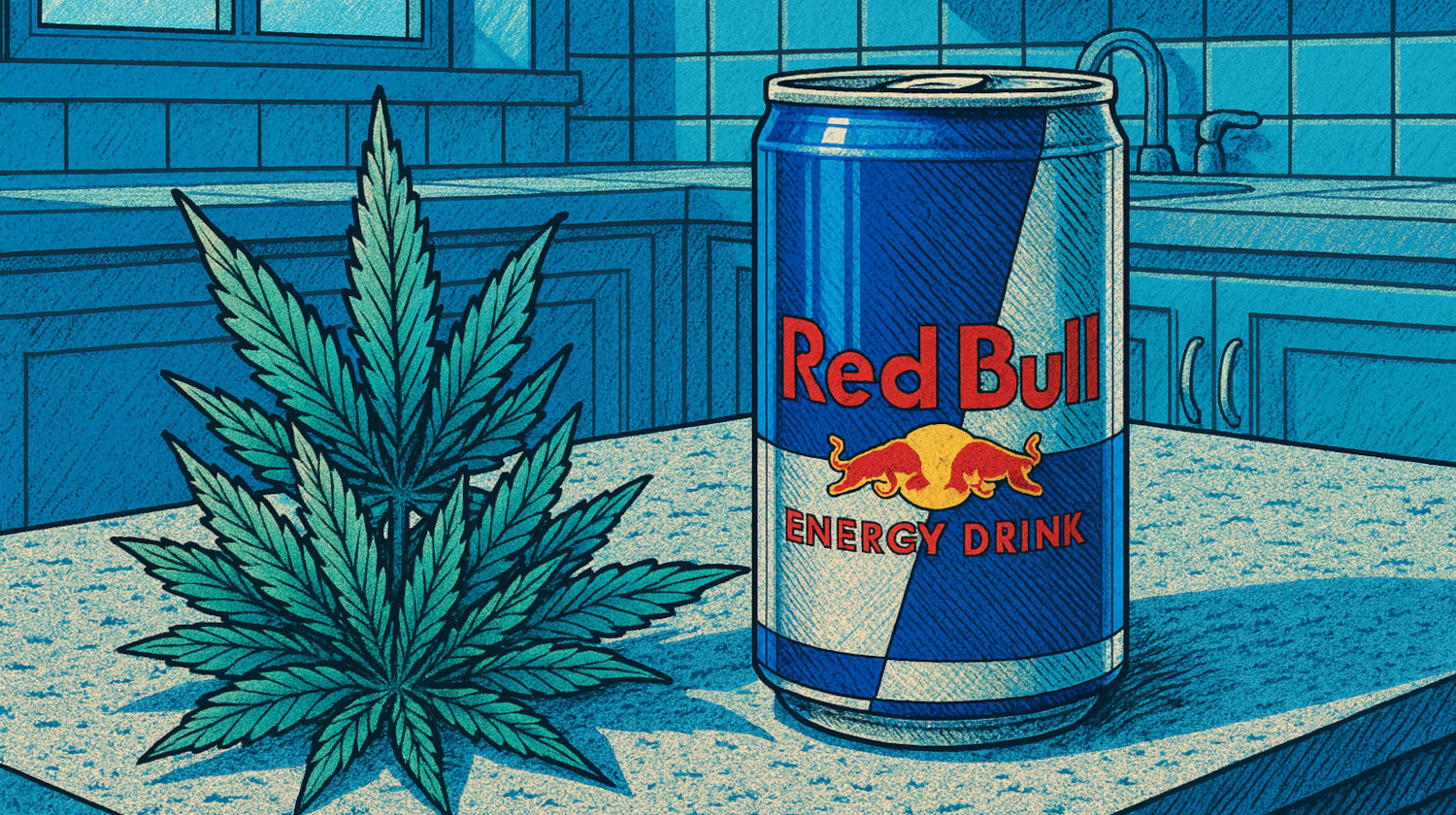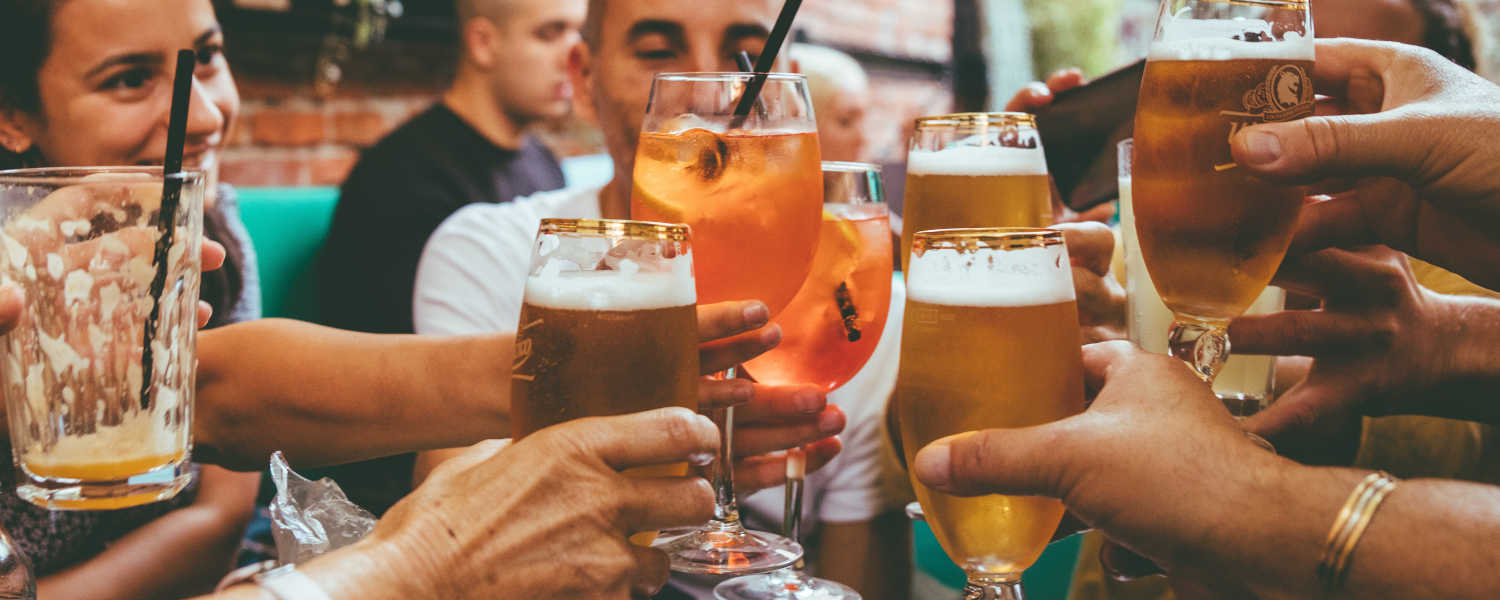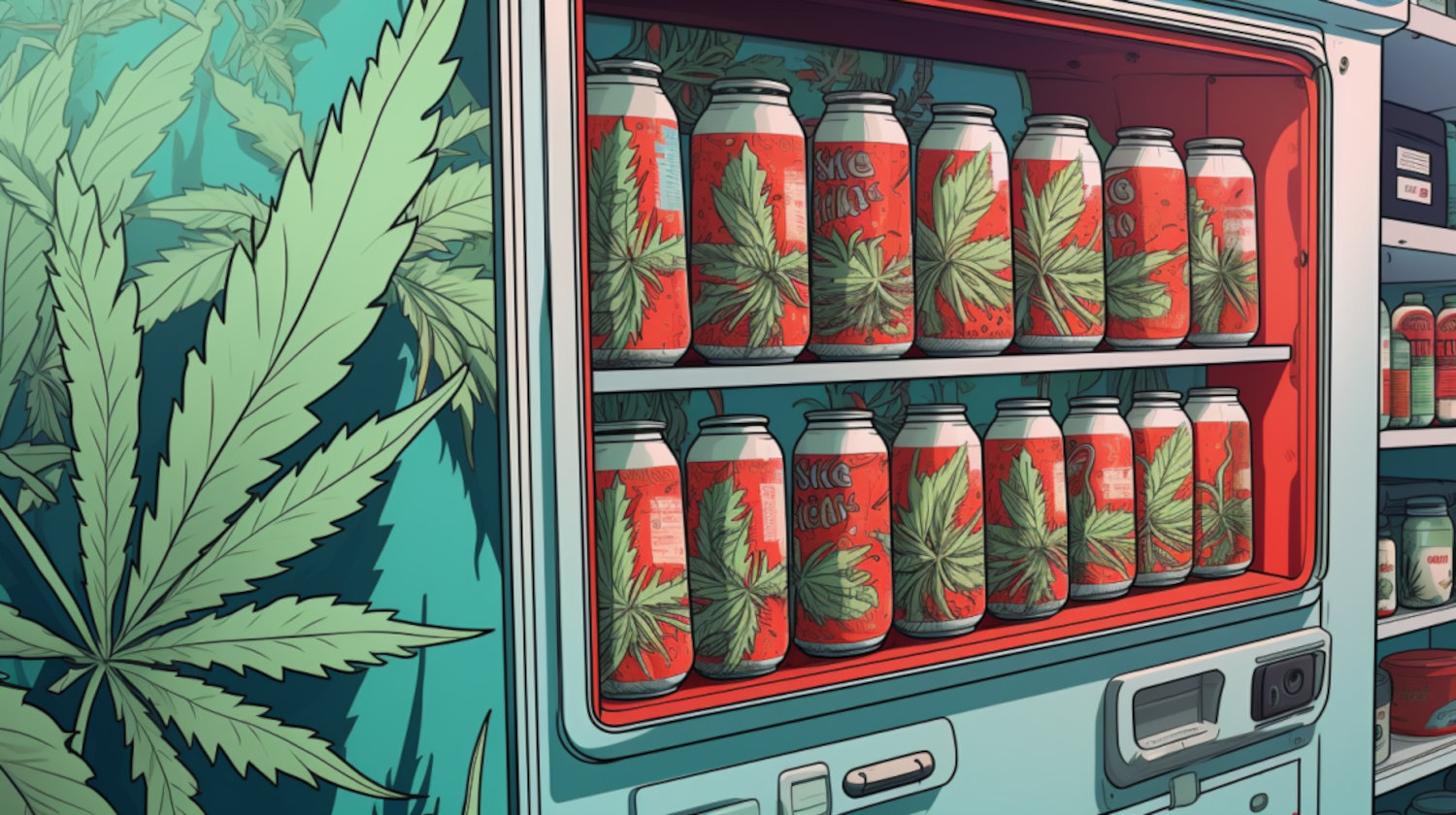Key Takeaways
- Mixing cannabis and Red Bull hasn’t been studied directly, but both can affect the heart, mood, and memory.
- Some users report more energy or creativity, while others experience jitters or anxiety.
- Overindulgence raises risks, so moderation and consulting a healthcare provider are recommended.
Energy drinks are one of the top three beverages on the market, with Red Bull, in particular, selling more than 11.5 billion cans in 2022 alone.
Cannabis use is increasingly prevalent, especially as legalization expands accessibility. The ease of access to both Red Bull and weed has generated a few common questions about the safety of simultaneously being under the influence of these substances.
What Happens When You Mix Red Bull and Weed? Risks and Side Effects
It is recommended that no more than 400 mg of caffeine be consumed in one day by one person, but the average individual consumes around 135mg. One Red Bull contains about 111mg, so occasionally, one or two of these drinks may not be a cause for concern for the average consumer.
If you’re having more than one, the high levels of caffeine and sugar can overstimulate certain bodily functions, particularly regarding cardiovascular system and liver health. When mixed with other substances, like alcohol, the CDC notes that energy drinks can create a dangerous situation where the user is more confident in how alert and sober they are, which may lead them to consume more alcohol, resulting in alcohol poisoning or other risks.
But what about energy drinks and weed?
Just as Red Bull can have adverse side effects, so can cannabis.1 The research regarding the two substances together is focused on the likelihood of specific demographics consuming the two.2,3 While there are no studies on how energy drinks and cannabis interact specifically, there are a few studies on how caffeine and cannabis interact.
One study on rats found that cannabis and caffeine together increased levels of GABA and dopamine.4 Animal studies don't always translate to human outcomes, though. Further research is needed to understand these effects in people.
Another study focused on the effects of the substances on memory. Cannabis is known to affect short-term memory through its interaction with the hippocampus. These researchers found that caffeine did not counteract the effects that cannabis had on recollection but made them worse.5
These findings raise questions about how cannabis and caffeine might interact. For now, direct research on energy drinks and cannabis in humans is lacking. Consumers with cardiovascular, liver, or anxiety-related conditions should be particularly mindful of mixing the two substances.
What is Red Bull?
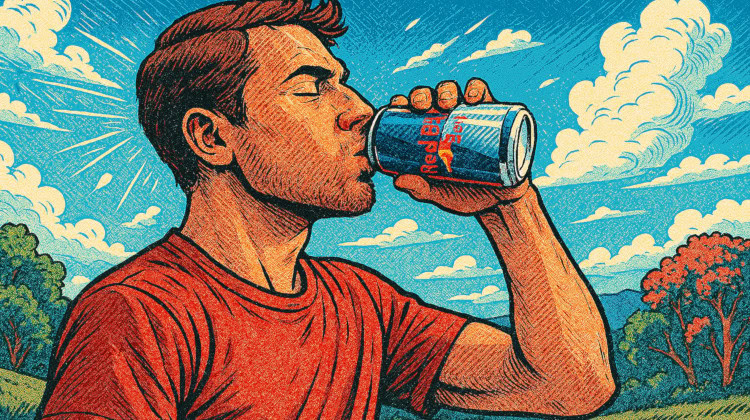
There are currently hundreds of different brands of energy drinks for consumers to choose from. Still, Red Bull remains one of the top-performing and most recognizable producers and marketers of these beverages, and they were named one of the world’s most valuable brands in 2020.
Established in 1987, Red Bull has sold billions of cans worldwide, including sugar-free, zero-calorie, and limited-edition flavors.
While energy drinks are available to anyone with the funds and a store stocked to sell them, Red Bull targets younger demographics of college students, adventure seekers, and busy working individuals through its athlete sponsorships and creative advertising. Many of these characteristics overlap with the average recreational cannabis consumer.
Redbull and similar beverages contain high levels of sugar, caffeine, various B vitamins, and taurine, which help stimulate the body and create feelings of increased energy.6 These ingredients work with the body’s cardiovascular system to increase heart rate and blood pressure.7
One research review found that energy drinks may temporarily improve alertness, memory, and physical performance.8 However, the evidence is mixed. More research is necessary to confirm long-term safety or effectiveness. These effects are the main reasons people drink beverages like Red Bull. However, as with most products that stimulate the body, they may not always induce beneficial effects.
Researchers in the same review also found that energy drinks may trigger adverse side effects on cardiovascular, neurological, psychological, gastrointestinal, metabolic, and renal function. They concluded that caution should be taken when consuming these beverages until further studies confirm their safety and effectiveness.
Another review found that the most common adverse effects of energy drinks are insomnia, jitteriness, and upset stomach.9 These effects can be further exacerbated by long-term consumption of the beverages and mixture with other substances, like alcohol.10
Why Do People Mix Red Bull and Weed?
Combining cannabis and caffeine is more common than many people think, especially considering how readily available both substances are. Despite the ‘stoner’ or ‘pothead’ stereotypes perpetuating the idea that cannabis automatically makes people tired and lazy, regular cannabis consumers report different effects.
The caffeine/cannabis duo is so common that it has even been coined as a ‘hippie speedball’ or ‘Seattle speedball’ for its reported potential to heighten energy and creativity. The combination supposedly brings the best of both worlds: relaxation and enhanced creativity from cannabis, along with the energy and cognitive boost of caffeine. It should be noted that these benefits are purely anecdotal. However, no research supports the notion. Everyone is different, so it’s important to proceed cautiously.
Is It Safe to Take Energy Drinks with Weed?
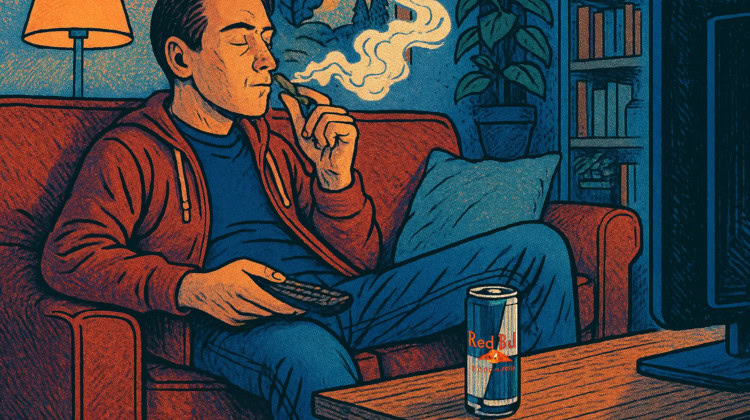
For healthy adults without underlying conditions, occasional cannabis and caffeine use may not pose major risks. It's important to note that everyone reacts differently. If you're unsure, it’s best to consult with a healthcare provider first.
Overindulgence in both these substances, particularly energy drinks, can put added pressure on the body and result in adverse side effects. Individuals with pre-existing health conditions that make them sensitive to cannabis or caffeine’s effects should consult their doctor before consuming either.
Precautions When Taking Red Bull and Weed
To help ensure a pleasant experience, consider the following before indulging in cannabis and energy drinks simultaneously.
- Consult a health professional. It may sound unnecessary, but if you plan on making this a recurring event, it’s essential to know if you’re sensitive to caffeine or cannabis. Specific demographics may be more at risk than others – particularly older people and those with anxiety, cardiovascular, or liver ailments. If you experience a racing heartbeat or difficulty breathing after consumption of cannabis, energy drinks, or both, contact a medical professional immediately.
- Be mindful of your dosage. Both caffeine and cannabis can be great when you consume just enough to get your desired effects. However, overindulgence in one or both of these two substances may trigger adverse side effects that can be unpleasant.
- Get comfortable in a safe space. Some users report stimulating effects from combining cannabis and Red Bull. So, getting comfy in one spot might feel challenging. However, being in a place you’re familiar with and can hang out in for a while ensures you can let any unpleasant feelings pass in a secure environment. At the very least, being in a friendly space will make the experience more enjoyable and less stressful.
- Make sure you have extra resources. If you’re trying to enhance your activity with cannabis and caffeine, make sure you have your goal set. Whether work-related, creative projects, exercising, or whatever you need to be energized for, lay out what you’ll need to do before you consume. Also, make sure to have water, snacks, and maybe even some form of CBD on hand, as it may help to mitigate any adverse effects from THC.
Alternatives to Red Bull and Weed
Red Bull and other energy drinks aren’t necessarily the best source of caffeine for everyone. If you’re looking for an alternative way to enhance your cannabis experience, consider coffee, tea, or another natural caffeine source.
If you’d prefer your cannabis and caffeine in one convenient package, some companies have started to combine the two in one beverage for consumer convenience. Today’s legal cannabis market has produced various infused consumer beverages, including weed energy drinks.
For those who want to skip the caffeine, plenty of drink options are available with only a cannabis infusion and an added sweet taste. If you’d like to cut caffeine and sugar but still want the potentially creative boosting effects of cannabis, you may be able to choose a cultivar with the right combination of terpenes and cannabinoids.
For the best results, keep note of how much cannabis and/or caffeine you’re consuming and adjust accordingly. Some cannabis cultivars are better suited for relaxation or sleep. It’s best to stay open to trying different varieties as many other outside factors can influence the effects.
If you experience any adverse side effects, consult a medical professional immediately.
References
- Volkow ND, Baler RD, Compton WM, Weiss SRB. Adverse Health Effects of Marijuana Use. New England Journal of Medicine. 2014;370(23):2219-2227. doi:https://doi.org/10.1056/nejmra1402309 ↩︎
- Hladun O, Papaseit E, Martin S, et al. Interaction of Energy Drinks with Prescription Medication and Drugs of Abuse. ProQuest. 2021;13(11):1532. doi:https://doi.org/10.3390/pharmaceutics13101532 ↩︎
- Leal WE, Jackson DB. The role of energy drink consumption in the intention to initiate marijuana use among adolescents. Addict Behav. 2019;93:240-245. doi:10.1016/j.addbeh.2019.02.008 ↩︎
- Owolabi JO, Olatunji SY, Olanrewaju AJ. Caffeine and Cannabis Effects on Vital Neurotransmitters and Enzymes in the Brain Tissue of Juvenile Experimental Rats. Ann Neurosci. 2017;24(2):65-73. doi:10.1159/000475895 ↩︎
- Panlilio LV, Ferré S, Yasar S, Thorndike EB, Schindler CW, Goldberg SR. Combined effects of THC and caffeine on working memory in rats. Br J Pharmacol. 2012;165(8):2529-2538. doi:10.1111/j.1476-5381.2011.01554.x ↩︎
- Higgins JP, Tuttle TD, Higgins CL. Energy beverages: content and safety. Mayo Clin Proc. 2010;85(11):1033-1041. doi:10.4065/mcp.2010.0381 ↩︎
- Wassef B, Kohansieh M, Makaryus AN. Effects of energy drinks on the cardiovascular system. World J Cardiol. 2017;9(11):796-806. doi:10.4330/wjc.v9.i11.796 ↩︎
- Alsunni AA. Energy Drink Consumption: Beneficial and Adverse Health Effects. Int J Health Sci (Qassim). 2015;9(4):468-474. ↩︎
- Nadeem IM, Shanmugaraj A, Sakha S, Horner NS, Ayeni OR, Khan M. Energy Drinks and Their Adverse Health Effects: A Systematic Review and Meta-analysis. Sports Health: A Multidisciplinary Approach. 2020;13(3):265-277. doi:https://doi.org/10.1177/1941738120949181 ↩︎
- Munteanu C, Rosioru C, Tarba C, Lang C. Long-term consumption of energy drinks induces biochemical and ultrastructural alterations in the heart muscle. Anatolian journal of cardiology. 2018;19(5):326-323. doi:https://doi.org/10.14744/AnatolJCardiol.2018.90094 ↩︎
The information in this article and any included images or charts are for educational purposes only. This information is neither a substitute for, nor does it replace, professional legal advice or medical advice, diagnosis, or treatment. If you have any concerns or questions about laws, regulations, or your health, you should always consult with an attorney, physician or other licensed professional.

